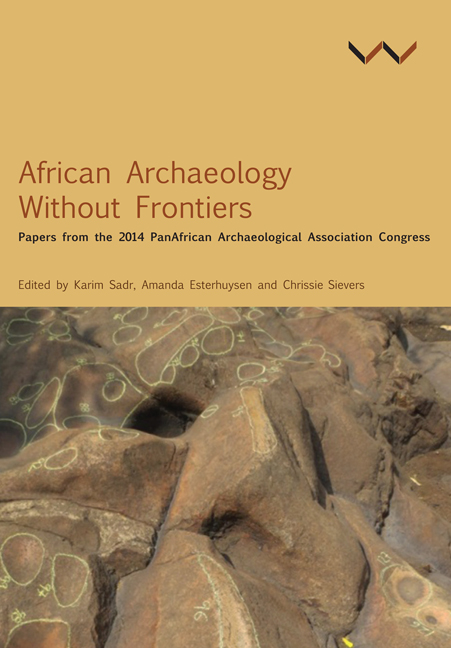 African Archaeology Without Frontiers
African Archaeology Without Frontiers Book contents
- Frontmatter
- Contents
- Acknowledgements
- List of Figures and Tables
- Introduction: An Invitation Fulfilled
- Keynote Address 1: Imagining an African Archaeology Without Frontiers
- Keynote Address 2: A Continental Vision for African Archaeology
- 1 The ‘Useable’ Archaeology of African Farming Systems
- 2 Defining Cultural Heritage among the Makonde of Tanzania
- 3 The Indigenous Roots of Swahili Culture in Pangani Bay, Tanzania
- 4 Is This an Anvil? Iron Bloom Crushing Sites in Northern Togo
- 5 L'art Rupestre au Cameroun, Nouvelles Découvertes et Contribution à L'iconographie Sous-Régionale
- 6 Archaeology and History in Iron Age Settlements in the Congo Basin
- 7 Learning from Glass Trade Beads at Thabadimasego, Botswana
- 8 Blurring Boundaries: Forager–Farmer Interactions in the Middle Limpopo Valley
- 9 Heritage Management and the World Wide Web: South African Challenges
- Contributors
- Index
Keynote Address 1: Imagining an African Archaeology Without Frontiers
Published online by Cambridge University Press: 15 March 2018
- Frontmatter
- Contents
- Acknowledgements
- List of Figures and Tables
- Introduction: An Invitation Fulfilled
- Keynote Address 1: Imagining an African Archaeology Without Frontiers
- Keynote Address 2: A Continental Vision for African Archaeology
- 1 The ‘Useable’ Archaeology of African Farming Systems
- 2 Defining Cultural Heritage among the Makonde of Tanzania
- 3 The Indigenous Roots of Swahili Culture in Pangani Bay, Tanzania
- 4 Is This an Anvil? Iron Bloom Crushing Sites in Northern Togo
- 5 L'art Rupestre au Cameroun, Nouvelles Découvertes et Contribution à L'iconographie Sous-Régionale
- 6 Archaeology and History in Iron Age Settlements in the Congo Basin
- 7 Learning from Glass Trade Beads at Thabadimasego, Botswana
- 8 Blurring Boundaries: Forager–Farmer Interactions in the Middle Limpopo Valley
- 9 Heritage Management and the World Wide Web: South African Challenges
- Contributors
- Index
Summary
It is with humility that I address the 14th Congress of the PanAfrican Archaeological Association for Prehistory and Related Studies and the 22nd biennial meeting of the Society of Africanist Archaeologists. I am honoured to be the first Kenyan to address this congress 63 years after the scheduled congress was withdrawn. I wish to thank Professor Karim Sadr for inviting me to address this august group. I doubt that I can pretend to walk in the footsteps of the fathers who founded the congress 66 years ago. What I can proudly assert is that the purpose of that congress was to create an African archaeology without frontiers. Indeed, throughout much of its history, the African continent was a frontier-less entity. People as well as its bounty of life forms moved freely across this beautiful, diverse landscape. They still do today except under quite different conditions and circumstances. Professor Sadr asked me to speak to the theme of an African past and future that is not bound by frontiers, real or imagined, that divide archaeologists and diminish the impact of the continent's contributions to global history.
The theme of the 2014 joint meeting, African Archaeology Without Frontiers, challenges us to transcend national, linguistic, disciplinary and epochal boundaries that separate archaeology's practitioners in Africa. Often, archaeologists work on what are essentially similar research questions, be they focused on technological, ecological, economic or even political themes. Often, these themes mirror the universal questions that are aimed at identifying global patterns. African archaeology has moved forward from its early days as a peripheral sub-discipline of European prehistory to being a diverse field at the centre of global archaeology. Today, practitioners of African archaeology are drawn from all corners of the world. There are research and teaching programmes involving Africa in archaeology departments all over the world. The diversity of practitioners cuts across gender, class, ethnic and national identities.
This is an exciting time to be an archaeologist working in Africa precisely because this may well be the only continent where archaeology in all its dimensions – from hominid evolution to protohistory – can be studied. Furthermore, there are few restrictions on who can conduct research in Africa and on what topic.
- Type
- Chapter
- Information
- African Archaeology Without FrontiersPapers from the 2014 PanAfrican Archaeological Association Congress, pp. xxi - xxviiiPublisher: Wits University PressPrint publication year: 2016


